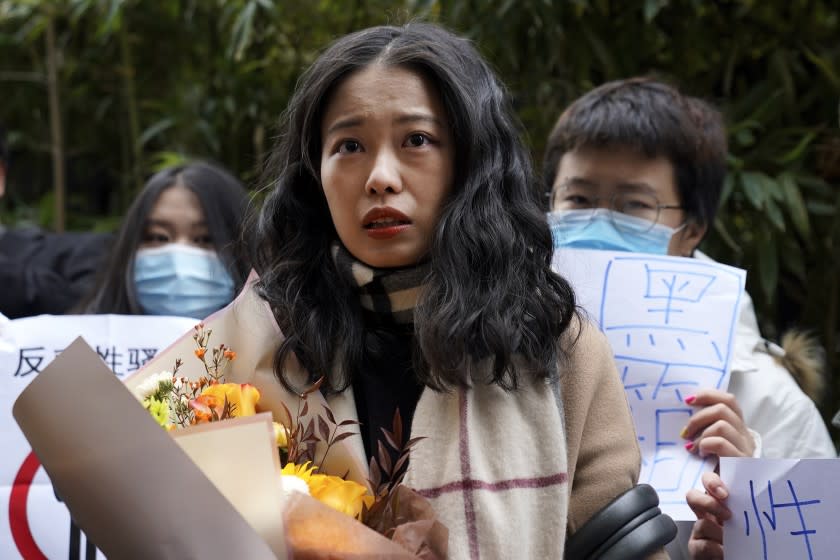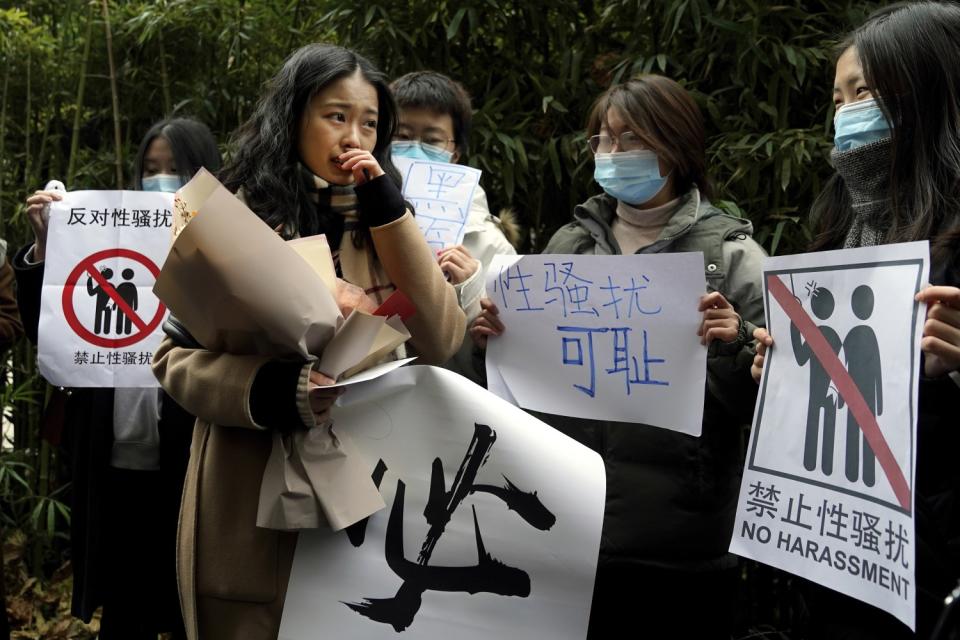Her #MeToo trial's making history in China and sparking rare solidarity

Most of them came alone: on their lunch breaks, after class, into the December cold, to support a young woman they’d read about but never met.
She’d dared to speak of her alleged sexual assault by a famous TV host while working as an intern at state broadcaster CCTV. When he sued her for defamation, she countersued, demanding a public apology and about $7,600 in damages. Her trial had been delayed for two years, but now, she was going to court.
Zhou Xiaoxuan, 27, more widely known by her nickname Xianzi, became a pioneer of China’s #MeToo movement in 2018, when she accused Zhu Jun of groping and kissing her in a dressing room in 2014. Despite police warnings, pressure on her family, online censorship and harassment, Zhou has persisted — one of the few to make it into court on claims of sexual misconduct, which China did not recognize as grounds for legal recourse until last year.

“Xianzi, jia you! Add oil!” shouted supporters who gathered in front of the Haidian People’s Court this week, using a Chinese phrase of encouragement. Some raised signs that read: “We demand an answer from history.” A young woman pulled out her lipstick to write #MeToo on another woman’s mask. A young man biked around the court wearing a pig mask and military hat, referencing homonyms for the accused TV host’s name.
It was a rare glimpse of public demonstration in China, where civil society and protest have been suppressed in recent years. The numbers were small: about 100 supporters in person, along with about 2,500 people who joined WeChat groups following Zhou's case. The accused TV host did not attend. The hearing was closed to the public and dragged from 1:30 p.m. to midnight with no conclusion, only an announcement that the trial would continue later.
Even if Zhou loses, supporters said, she had clinched a victory for women's rights by getting her case into court and drawing strangers together in a cathartic moment of solidarity.
Police officers patrolling outside the court ordered supporters to not display their signs, but otherwise allowed the crowd to stay. Most were women, standing and shivering in twos and threes, some passing around heat packs to keep warm.
Linda Wang, 30, a former journalist now working in tech, still wore her company lanyard with a blue puffer jacket. She had never met Zhou, but likened her to an egg hurling itself against a rock. “That only happens when the weak have already tolerated more than they can bear,” she said. “I sympathize with the egg, because I’ve also experienced being weak and crushed.”
Wang was also preparing to file a lawsuit soon for workplace exploitation, though not related to sexual misconduct. “I hope our society can have more equality and dignity for regular individuals,” she said.

Lindsay Qi said she’d been following Zhou's case since 2018, when a small wave of #MeToo cases gained notoriety in China. Women began to speak publicly about sexual harassment and assault from men in high positions at universities, religious institutions, nonprofits and media and tech. It was a time of awakening for many.
“Before that, many of us just thought, as long as it wasn’t rape, it’s not a big deal,” said Qi, 44, who also works in tech. “Many women are harassed not once, but multiple times growing up. You don’t even tell your closest friends or family. You bury it in your heart. It’s a sort of shame, and it becomes something you suppress, and it affects your future thoughts and actions.”
Qi had hesitated about whether to come to Zhou's hearing. People her age were mostly too busy and cynical to get involved in social issues, she said — “they know that in China, fighting for such things brings no results.” But Zhou inspired her to seek change even within a flawed system, she said: “She gives us all the courage to protect ourselves.”
Such courage is hard to summon when challenging men such as Zhu, one of the nation's most powerful TV personalities. His face and voice are recognizable in every Chinese household, given that he has co-hosted CCTV's Chinese New Year gala program 21 times since 1997. He has been praised in official channels as a model of "positive energy," a political euphemism pushed by President Xi Jinping for filling Chinese media with propaganda while censoring criticisms.
Zhu stopped hosting the New Year gala in 2018, the same year Zhou filed her lawsuit. But he moved immediately to producing, directing and starring in a new CCTV program called "Trust in China," a series that used letters written by Chinese Communist Party members to tell inspiring stories about their sacrifice and struggle for the nation.

A former coal industry worker who gave his name only as Bing, 34, was “99% sure” Zhou would lose her lawsuit because of lack of evidence. “But winning or losing isn’t the goal," he said. "Our goal is to put this in the spotlight, so that all those in powerful positions will think twice before they try to do something like this.”
Sexual harassment also affects men, he added: “It’s just that no one dares to speak up. But I believe there will be someone like Xianzi, who is not afraid of being smeared, in the future. There will be more and more who dare to speak.”
A 15-year-old who gave only her first name, Alexis, said she’d come alone after reading about Zhou online. “Nobody discusses this around me. I’m the only person who’s focusing on this thing in my real life, and I’m a little sad about it,” she said. “But we need to pay more attention to these unrighteous things."
Two university students, Tang Tang, 23, and Xing Xing, 21, had each come to the courthouse alone as well. Xing, a sociology student, had been drawn to the feminist movement for several years.
Tang said Zhou's case was one of several issues that she had been following, among them Beijing's expulsion of migrant workers and forced evictions of low-income renters. “You have to care about these issues,” she said. “As people who are aware, this is all we can do — to come and show some support. What we can do is truly too limited.”
Most of the supporters were aware of those limitations. The man in the pig mask, 30, gave his surname, Fu, and said he worked in the film industry. Women’s and sexual minorities’ rights were among the few sensitive topics in China allowed a degree of public discussion — which could be quickly silenced if it led to political organizing.
“Everyone here is an atomized individual. That’s better for us and for her,” Fu said. He compared Chinese authorities to Cronus, the father of Zeus in Greek mythology who ate his own children for fear they would usurp his power.
“In this country, they destroy all small groups that develop and organize, because that’s how they came to power themselves. If anyone starts to meet regularly, to make groups and write goals and slogans — to do anything like party building — they will be broken apart.”

In 2015, authorities arrested five feminist activists on the eve of International Women’s Day for planning to hand out anti-sexual-harassment stickers on public transportation in Beijing, Guangzhou and Hangzhou. They were jailed for 37 days and interrogated about whether China’s feminists were being funded by foreign forces.
In 2018, the Weibo and WeChat accounts of Feminist Voices, the most influential social media account for feminists in China at the time, were banned permanently. The word “feminism” has become a sensitive term on the tightly controlled Chinese internet, often accused of being linked with “hostile Western forces.” Some of the most vocal organizers in China’s feminist movement are now living overseas, while offline organizing has become nearly impossible within China.
The fight for women's rights persists, personified by individuals such as Zhou and a quiet network of social workers, lawyers and therapists working to help survivors of sexual harassment and assault. In June this year, a social worker who sued her former boss at a Chengdu-based nonprofit for harassment won the first successful sexual misconduct lawsuit in China’s history.
A new civil code approved in May holds employers responsible for preventing and addressing sexual harassment, though it does not include provisions for enforcement. Such victories have encouraged plaintiffs such as Zhou, who has become an activist while waiting for her case to begin.
“We only knew how to hug and cry together in the beginning, but later we learned how to hold hands, to be each other’s light, to survive and to battle,” she wrote on Weibo the day before her trial. “I want this lawsuit to become a gathering, a wonderful moment of commemorating these years when we all spoke and fought together.”
Outside the courthouse, supporters waited into the night. Bing, the coal industry worker, said he had read a column in the liberal magazine Southern Weekly 10 years ago titled: “Attention is power. Onlookers can change China.” He wanted to give Zhou his attention, if nothing else.
“We just want her to know, she’s not alone,” he said. “There are people who care.”
This story originally appeared in Los Angeles Times.

